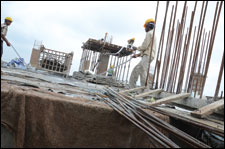 The real estate market is becoming investment of choice in the global market. As real estate becomes an increasingly complex and global industry, companies must look to new talent pools to keep pace with industry growth, notes Vishwanath Agarwal, Chairman & Managing Director, Techman Buildwell Pvt. Ltd.
The real estate market is becoming investment of choice in the global market. As real estate becomes an increasingly complex and global industry, companies must look to new talent pools to keep pace with industry growth, notes Vishwanath Agarwal, Chairman & Managing Director, Techman Buildwell Pvt. Ltd.
The real estate industry has been accounting for a lion’s share of India’s GDP, but lately there is apparent demand-supply gap in this sector. Given the potential future growth of real estate, construction and infrastructure sectors, the industry is believed to be facing a considerable shortage of manpower, which may impede India’s growth aspirations. There is an apparent gap in demand-supply of the number of professionals in the real estate industry and the main gap is that people don’t have in-depth knowledge about the sector and they stay restricted to their domains. The solution to this gap is an exchange programme of employees in different departments which will help them to increase their knowledge.
A gigantic challenge that has come to light is the lack of capacity at every level in both qualitative as well as quantitative aspects—of architects, chartered accountants, land valuers, planners and many more. In fact, some of the more progressive states that have been taking active steps on urban renewal and planning are those who have been able to address their capacity challenges.
This has also enabled better financial viability for projects and subsequently improved public service delivery. There is a demand-supply gap in the core professions group comprising of civil engineers, architects and planners which are the foundation of technical skills. To deliver potential real estate space and planned infrastructure, India would need nearly civil engineers, architects and planners on an average, over the next decade. However, the corresponding average supply is very less as to what is expected.
 Core professionals
Core professionals
The estimated supply of non-core professionals in the built environment sector is nearly three times the supply of core professionals, demonstrating that ‘non-core professionals’ are being drawn into the sector to compensate for the shortage of ‘core professionals’. However, without sector specific training, they fall short of the desired skill sets. They will need to be trained in the real estate, construction and infrastructure sectors, to convert them into ‘specialised’ professionals. New demand for specialised professions is now emerging in order to enhance professional expertise and improve productivity in this fast paced sector. These are valuation, quantity surveying, facilities management and sustainable development.
Given that the industry is already beginning to be impacted by a demand-supply mismatch, the projected shortage of various built environment professionals becomes a cause for significant concern as it threatens the sustainability of high growth sectors of real estate, construction and infrastructure. The urgent need-of-the-hour is for all stakeholders across government, academia and industry to formulate remedial measures that help increase new supply and up-skilling of the existing workforce.
There are a number of factors responsible for resulting in these shortages in professionals. These are summarised as inadequate number of colleges/seats; orthodox academic structures with limited room to adapt to innovation and market needs; curriculum does not explicitly capture emerging specialised skill set requirements; lack of adequately trained faculty that is aware of latest and emerging technologies; failure to keep up-to date with constant introduction of new technologies; availability of better pay scales in other fields and countries; lack of adequate number of training programmes for professionals already in the discipline; and lack of formalised incentive structures for these professionals to work towards their continued professional enhancement.
I would therefore request all relevant stakeholders including the government to come together to create a roadmap that addresses this capacity challenge to ensure that the sector is able to ensure improved service delivery over the coming years.
In relation to the predicted higher economic growth in the coming years, these skill-set shortages are only likely to be exacerbated in the future unless remedial measures towards increasing new supply and up-skilling existing workforce are not taken on a priority basis. If we were to continue with an as-is scenario, with current productivity and skill sets possessed by core professionals, and where capacity of educational institutes is not increased from the actual capacity in 2009, by 2020, India will need over five million civil engineers, architects and planners but will be able to produce less than one million of these professionals.
This demand-supply gap of professionals is therefore poised to become a threat for the high growth of real estate, construction and infrastructure sectors in India.
Many predict that the real estate market will continue to grow in the coming years. Real estate is becoming an investment of choice in the global market. As real estate becomes an increasingly complex and global industry, companies must look to new talent pools to keep pace with industry growth.











